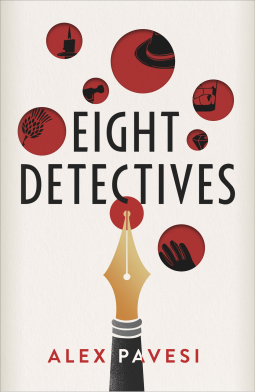
Eight Detectives
by Alex Pavesi
Genres: Crime, MysteryPages: 352
Rating:

Synopsis:A thrilling, wildly inventive nesting doll of a mystery, in which a young editor travels to a remote village in the Mediterranean in the hopes of convincing a reclusive writer to republish his collection of detective stories, only to realize that there are greater mysteries beyond the pages of books.
There are rules for murder mysteries. There must be a victim. A suspect. A detective. The rest is just shuffling the sequence. Expanding the permutations. Grant McAllister, a professor of mathematics, once sat down and worked them all out – calculating the different orders and possibilities of a mystery into seven perfect detective stories he quietly published. But that was thirty years ago. Now Grant lives in seclusion on a remote Mediterranean island, counting the rest of his days.
Until Julia Hart, a sharp, ambitious editor knocks on his door. Julia wishes to republish his book, and together they must revisit those old stories: an author hiding from his past, and an editor, keen to understand it.
But there are things in the stories that don’t add up. Inconsistencies left by Grant that a sharp-eyed editor begins to suspect are more than mistakes. They may be clues, and Julia finds herself with a mystery of her own to solve.
Alex Pavesi's The Eighth Detective is a cerebral, inventive novel with a modern twist, where nothing is what it seems, and proof that the best mysteries break all the rules.
I received a copy of this book for free in exchange for an honest review. This does not affect my opinion of the book or the content of my review.
Alex Pavesi’s Eight Detectives is certainly a fascinating idea: the odd-numbered chapters are short stories, written in-world by one of the characters, which each have strange contradictions and illustrate a mathematical theory — the mathematics of mystery fiction, no less. One of the characters thinks that each story also holds a clue to a particular murder, and spends her time trying to pry into it and figure out the puzzle within the mysteries.
It all fell apart a bit for me with the alternative endings to each of the stories — too much recapping, and sometimes the story as you first read it makes more sense. Of course something like it is needed to bring the stories together and complete the puzzle around in the frame story, but it felt clunkily done. Maybe if there had been just one or two changed endings, or if the changed endings were shorter.
Also, it’s a silly thing to nitpick, but for some reason one of the characters says that nobody was interested in mystery fiction after the war, meaning World War II. I can’t tell if that’s supposed to be a genuine explanation (which would be ridiculous) or if it’s meant to be highlighting a certain character’s inconsistencies and lack of knowledge. I suppose I’d think better of it if it were the latter, and it would make sense given the givens, but hmm…!
It’s an interesting puzzlebox of a story, all the same.
Rating: 3/5

I read this one a while back, and have to agree: really intriguing concept, imperfectly done.